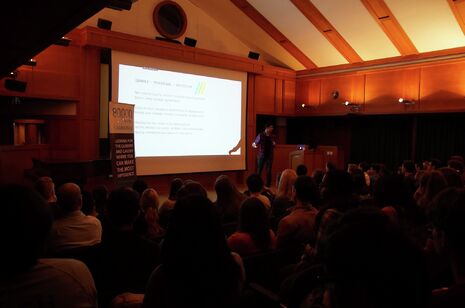David Goldberg: ‘Find the thing that gets you out of bed in the morning’
The CEO of Founders Pledge talks to Felix Peckham about how and why he founded the organisation encouraging tech companies to give away their money

David Goldberg is the founder and CEO of Founders Pledge. He’s naturally endearing, has a certain energy of positivity and a Californian accent that exudes confidence. The overwhelming impression is of somebody that is thoroughly competent and in control. David was invited to Cambridge, of which he is an alumnus, by 80,000 Hours and Giving What We Can for a talk and Q&A session. Both seek to encourage Cantabrigians to make a positive difference in the world, whether that be through charity or their careers.
David’s concept is not complicated and he summarises it succinctly: “Founders Pledge helps tech entrepreneurs to do good through their work and their lives by getting them to make a commitment that, when they have success in the future, they are going to give something back. They make a legal commitment to give to charity when they sell their business.”
I ask David why Founders Pledge insists on a two per cent minimum donation, which I naively consider to be piecemeal in the context of the many millions of dollars that tech firms are renowned for being sold for. “It turns out that it’s not actually very small when we’re talking about hundreds of millions of dollars,” he tells me. “While it is low in numerical terms, we really encourage people to give more than that; the average pledge is just shy of five per cent. This is a minimum that we found to be meaningful enough that people consider it as something important, but not too high that we lose those who wouldn’t give more than two per cent.”
David doesn’t deviate: he is to the point, simultaneously combining the anecdotes of his time as a Los Angeles financier, where he drove a Porsche to work everyday, and the subsequent loans that he had to take out in order to set up his own initiative.
While the concept is simple, the results are profound: Founders Pledge has facilitated the giving of $15.5 million to charities of donors’ choices and has secured a further $180 million in legally binding pledges since the programme began in 2015. David is committed to facilitating and empowering entrepreneurs to engage in philanthropic activity. This stems from earlier frustrating attempts at attempting to stimulate charity.
“I had been working in the social enterprise sector for about a year, supporting entrepreneurs who wanted to do good and make money. It wasn’t really very successful; we saw a lot of well-meaning people unable to really deliver on their promises. This wasn’t because they didn’t try hard enough. It was because they lacked the skills and experience to do it at that point.”
“So the thinking became: why don’t we help the best tech entrepreneurs become more social? If we can deliver a program that doesn’t infringe upon their ability to upscale a business and costs them nothing, that gives them complete control and potentially increases the size of the pie.”
Throughout the Q&A, audience members inundate David with technical and ethical questions. Unfazed, David explains to me why only the sale of a tech business, or ‘exit’, is ripe for charitable giving: “Profits are generally going to be quite small with technology businesses and they tend to get acquired quite quickly.”
“Snapchat still hasn’t made money and it is one of the biggest companies in the past five years. Twitter has been struggling as well; even Spotify has only been making money in the past few years, and these are the unicorns, so to speak. So, rather than focusing on profit, liquidity events are what is the most natural evolution for technology businesses.”
I ask David about his experience at Cambridge,where he only completed one year of his PhD: “It was a great experience. But I found academia, and focusing on the theoretical rather than the practical stuff, to be a waste of what could be my life.”
“So, I’d encourage people to think ‘so what’ about everything that they do. Is this the thing that I’m going to do for the rest of my life? And, if it’s not, why am I doing it?”
Feeling sufficiently in awe of David and Founders Pledge, I ask him how those contemplating entering the workplace could replicate his path and establish a career with a philanthropic and altruistic streak. “First, you want to do things that make you both happy and fulfilled. Those are distinct things. You want to find the balance between the two.”
“Find the thing that really gets you out of bed in the morning and pursue it. Hopefully it makes you a lot of money that you can start to give away. Or find a really exciting charity or a sector that you’re interested in and find out where there are gaps in the system and try to solve them.”
 Comment / The (Dys)functions of student politics at Cambridge19 January 2026
Comment / The (Dys)functions of student politics at Cambridge19 January 2026 News / Local business in trademark battle with Uni over use of ‘Cambridge’17 January 2026
News / Local business in trademark battle with Uni over use of ‘Cambridge’17 January 2026 Features / Exploring Cambridge’s past, present, and future18 January 2026
Features / Exploring Cambridge’s past, present, and future18 January 2026 News / Your Party protesters rally against US action in Venezuela19 January 2026
News / Your Party protesters rally against US action in Venezuela19 January 2026 Lifestyle / Seoul food19 January 2026
Lifestyle / Seoul food19 January 2026






